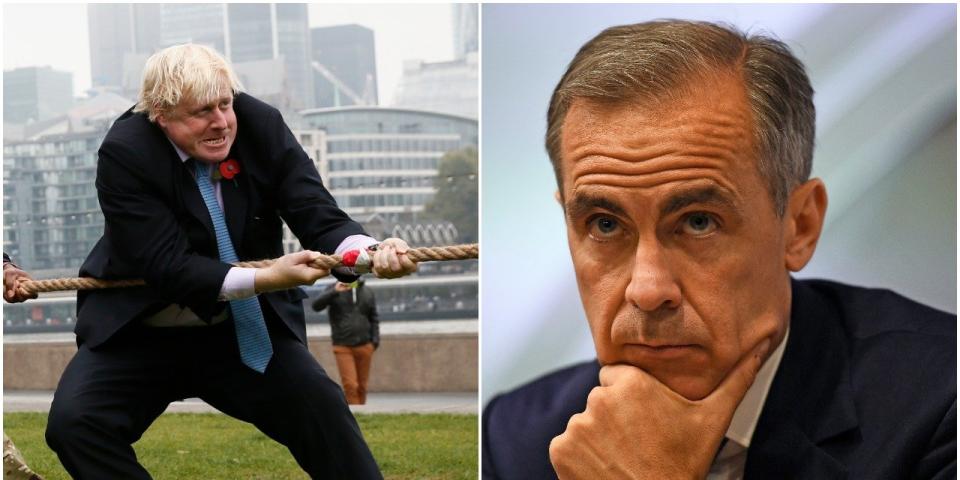The Bank of England is once again at war with pro-Brexit politicians

Reuters; Reuters
Foreign Secretary Boris Johnson takes aim at Bank of England Governor Mark Carney.
Johnson questions claims from Carney that the Brexit vote has already cost Brits £900 per household.
It is not the first time Carney has clashed with pro-Brexit politicians.
LONDON — Foreign Secretary Boris Johnson set himself on a collision course with the Bank of England on Tuesday, after calling into question claims made by Governor Mark Carney.
The comments came after the governor told a parliamentary committee that voting for Brexit lowered the household incomes of regular Brits, and has already caused economic damage.
Discussing why economic forecasts have been wide of the mark in recent years, Carney told parliament's Treasury Select Committee that: "Real household incomes are about £900 lower than we forecast in 2016. The question is why and what drove that difference. Some of it is ascribed to Brexit."
"Over the course of the last year and a half, there has been an impact relative to what we would’ve expected – even with some pretty good tailwinds at the back of this economy," he added.
Within hours of Carney's comments, Johnson (along with several other pro-Brexit MPs) had hit back, saying that "it is not the case" that Brexit is proving to be a negative for the UK economy.
"I believe that the chancellor of the exchequer has given a definitive answer on this matter, which is that it is not the case that Brexit has damaged the interests of this country," Johnson said at a press conference during a visit to the South American nation of Argentina.
"On the contrary, as you know, and as I’ve said repeatedly, when it comes to it I think that both the UK and Argentina will prosper, as a result of our ability to do unhindered and unfettered trade deals, as a result of our joint prospectus," he added.
Johnson is one of the most staunchly pro-Brexit figures in Theresa May's cabinet, and has consistently argued that leaving the EU will be an economic positive for the UK.
This is not the first time senior members of the Conservative government have criticised the Bank of England — which was given independence from Downing Street in 1997. Back in October 2016, the then new prime minister, Theresa May, criticised the bank's ultra loose post-crisis monetary policies, saying that a "change has got to come."
At the time, some believed that May was trying to influence bank policy, and therefore calling into question its independence. She later forced to clarify her comments, and make clear that this was not the case.
Mark Carney has been a particular target for the ire of Brexit supporting politicians in the last couple of years. He has faced numerous calls to resign, or be sacked, from his role as the guardian of Britain's monetary policy.
See Also:
SEE ALSO: The CBI just made a major intervention to keep Britain in a customs union after Brexit

 Yahoo Finance
Yahoo Finance 
